The new kids on campus
Host: Charles Darwin University, Katherine Rural Campus
Written by Alison Haines – VET Lecturer, Charles Darwin University.
In 2017 the Agriculture and Rural Operations team have close to two hundred students on forty stations, scattered across some of the most diverse and remote landscapes the Northern Territory has to offer. Developing student skills and knowledge as well as performing workplace assessments for these students is a big big job and so we would like to introduce our two newest team members.
One of our main challenges moving forward has been getting the right people. Both Fiona and I have extensive beef cattle industry experience, including on-the-ground industry supervisory experience and connections within the local community. This means we are able to “walk the walk” as well as “talk the talk”. Between us, we have been there and done most of what our students and their supervisors will encounter in their day to day work. If we haven’t, well, we aren’t afraid to ask for help from the experts and our industry connections help us find them. All in all, this helps us understand and work within station work programs, allowing us to build and maintain very successful working relationships. For our additional team members, we have sourced people with the specific skills and knowledge we require, who have a reputation for excellence in the industry and proven performance and supervisory ability in the workplace.
Because our assessors are working in other organisation’s properties and businesses, this requires excellent interpersonal, communication and negotiation skills, tact, diplomacy, confidentiality, and professionalism. The assessors must build and maintain successful client, student and supervisor relationships of mutual trust and respect to be most effective. Done right, this is a great help in ensuring students are completing theory work on time and that supervisors are ensuring students have ample opportunity to learn the appropriate workplace skills, allowing them to gain competence in their enrolled units. Getting and keeping the right people really is crucial to the success of the program.
So!! . . . We are excited to introduce our two new team members who started in February of this year. We convinced them it was a GREAT job, however when they started in February they were greeted with three solid weeks of full on office work, checking and rewriting assessments. They were both convinced they’d been had and/or lied to!
Inductions, preliminary training and office work finally complete, they set out on the road in late February. After a few trips together with Fiona closely supervising, they are now out on the road independently and are hopefully loving their career change. If you see them out and about, be sure to say Hi.
Here’s what they had to say:
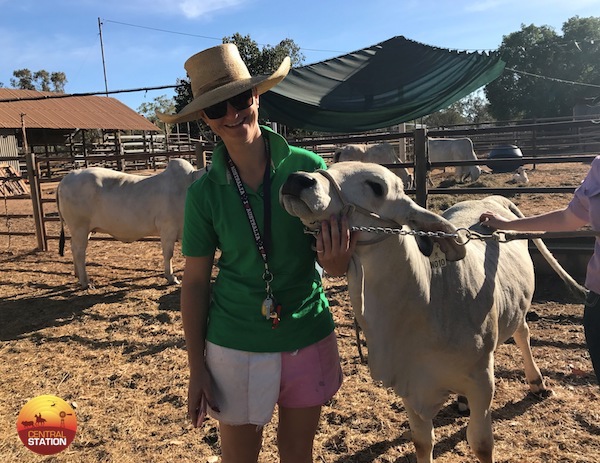 Tegan Dunn.
Tegan Dunn.
Tegan Dunn
In 2017, I started work as a VET Lecturer/Workplace Assessor – Agriculture and Rural Operations in Certificate II, III, and IV in Agriculture and Certificate II and III and Rural Operations for Charles Darwin University’s Katherine Rural Campus.
I enjoy this job because it allows me to travel the Northern Territory working side by side with big companies, private small stations, and contractors. Regardless of employer size, whichever qualification the trainee choses to complete, the same standards apply. Working with them, camping out with them and giving any assistance where needed is all part of the job. I have most recently come from running a contract mustering crew. Working for Charles Darwin University gives me the best of both worlds and a new challenge.
I like helping students learn and working with them in their own workplace/environment. I aim to help the students studying with our team by setting a high standard of education across NT, a blanket standard throughout that revolves around the correct procedures used in northern beef industry.
I feel with a uniform high standard and the same education/information, we can only better our industries Work Health and Safety, animal welfare, and reduce the environmental impacts.
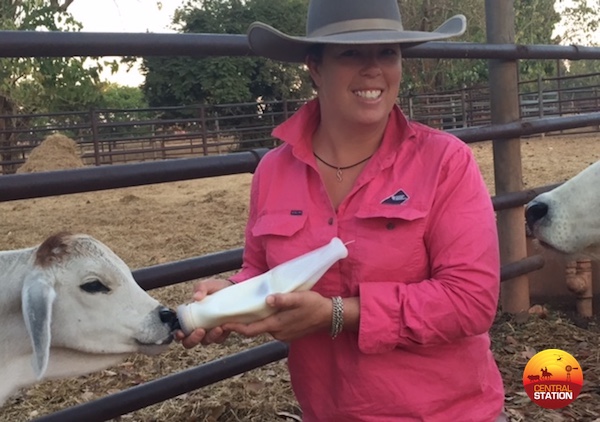 Kayla Kurnof.
Kayla Kurnof.
Kayla Kurnof:
I have recently joined the Charles Darwin University team in February 2017 as a VET Lecturer/Workplace Assessor in Agriculture and Rural Operations.
Originally from the Snowy Mountains, I have spent the last six years working at Victoria River Downs Station. Prior to working at “VRD” I spent time on the Barkly Tablelands and a short period in Canada working on a ranch. After almost a decade of commitment to the Northern Territory pastoral industry and a little less “bounce” than when I first started I was looking for a new career direction and so I started work with Charles Darwin University. This job allows me to give back to the industry by going out onto remote stations and helping train, educate, and assess new generation pastoralists. I have the best of both worlds really, I still get to go out and work on station while also having time in the office.
Outside of work I enjoy campdrafting, socialising, fishing (when I actually catch something) and exploring what exciting things the Northern Territory has to offer.
A little of Kayla and Tegan’s new “day-to-day”:
Once we are on the road the challenge is often finding students. Often the trainees you are looking for are mustering cattle somewhere in a three hundred square kilometre paddock. The solution here is flexibility, a map, a good UHF radio aerial, a packed lunch, and a sense of humour. We need to fit in, be flexible with station work programs, be prepared to camp out, get on a horse, jump in the yards, drive a truck, or help fix up a fence, along with having enough spare study guides, theory books and working pens for all students who “left their books back at the house, eighty kilometres away . . .”
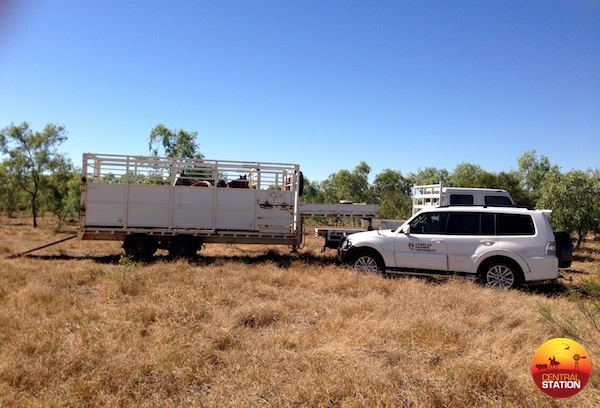 Ok, we found the trailer . . . where are the trainees??
Ok, we found the trailer . . . where are the trainees??
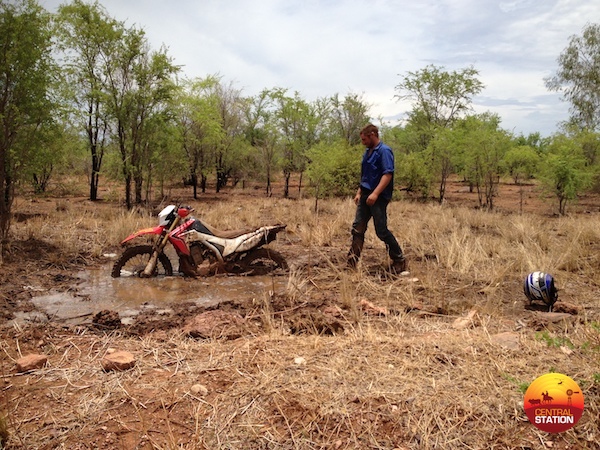 Sometimes trainees are “unavoidably detained” on the way to a theory session . . .
Sometimes trainees are “unavoidably detained” on the way to a theory session . . .
We need to be flexible in our assessment processes in terms of being able to do the theory tasks anywhere and anytime the student has the opportunity, which is usually after dinner or when waiting in the paddock for cattle to be brought in by the helicopter.
An important part of our day-to-day is to understand and support different cultures in the workplace. We regularly work with Indigenous people from all walks of life as well as international students like those involved in the Northern Territory Cattlemen’s Association Indonesia Australia Pastoral Program.
Understanding individual cultural sensitivities allows us to tailor our approach to these students learning and assessment. This can be as simple as not using complicated words where there is a language issue. A working knowledge about what is considered polite behaviour in the different cultures and belief systems we commonly encounter is essential.
It’s important to be aware of every person’s cultural background, regardless of colour or race. It’s imperative that we maintain and improve relations with stations and their staff. We strive to make our program one of value, to make it enjoyable and worthwhile for the students. As we all know, if people are enjoying themselves they are more likely to retain information and succeed.
If you are in the NT, we look forward to seeing you out there on the road!
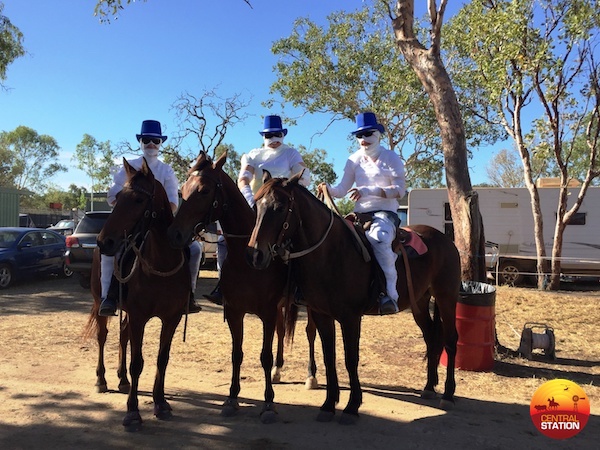 Of course, it’s important to make time for some fun! Fiona, Tegan, and Kayla as “mummies” won the best dressed team in the Teams Draft at the 2017 Katherine Show Campdraft in July. You guess who is who!
Of course, it’s important to make time for some fun! Fiona, Tegan, and Kayla as “mummies” won the best dressed team in the Teams Draft at the 2017 Katherine Show Campdraft in July. You guess who is who!
